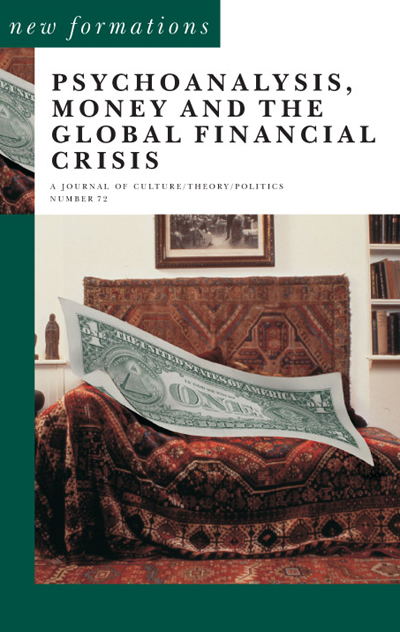
'Money is laughing gas to me' (Freud): a critique of pure reason in economics and psychoanalysis
New Formations - Print ISSN 0950-2378 - Online ISSN 1741-0789
Volume 2010 Number 72
'Money is laughing gas to me' (Freud): a critique of pure reason in economics and psychoanalysis
David Bennett
Abstract
Economic theory, since the time of Smith and Hume, has been operating with a model of homo oeconomicus as an autonomous, rational, self-interested calculator of cost-for-benefit. This presumed rationality of ‘economic man’ supposedly guarantees, in turn, the fundamental rationality of the ‘self-regulating’, ‘efficient’ market. Classical political economy, neoclassical economics and neoliberalism have all operated with this model. But the recent ‘global financial crisis’ was yet another reminder that the psychology of markets and financial dealers can seem far from rational. Even Alan Greenspan had to admit of the 2008-9 financial crash: ‘Those of us who have looked to the self-interest of lending institutions to protect shareholders’ equity (myself especially) are in a state of shocked disbelief’. From its inception, psychoanalysis has viewed the psychology of money as profoundly irrational - as a realm of illusion, neurosis, phantasy and psychopathology, both individual and collective. Freud, Ferenczi, Jones and Abraham were just the earliest psychoanalytic theorists to decode monetary transactions and relationships into their presumed unconscious motives. And yet, psychoanalysis itself has been notoriously reluctant to speak frankly of its own economics as a profession and business - of how ‘filthy lucre’ is the indispensable stuff of its own transactions. This essay stages a confrontation between two discourses, psychoanalysis and economics, which for much of their history have been mutually indifferent and mutually opaque. By confronting the implied subjects of these discourses with each other’s models of reason or sanity in money matters, rather than of irrationality or psychopathology, it questions the equation of economic rationality with individuated self-interest while seeking to deconstruct the century-old dichotomy between homo oeconomicus and homo psychologicus.
SORRY - you are not registered as being permitted online access to the full text of this article
You have the following options:
- If you are viewing this via an institution or academic library you can ask that your institution takes out a Subscription to this journal.
- If you already have a Personal Subscription please login below
Forgotten your username / password? Click here to locate
- Purchase an annual Personal Subscription
PRINT + DIGITAL personal subscription (£45 / year)
DIGITAL personal subscription (£30 / year)
A Personal Subscription provides immediate access not only to the single article you are seeking, but also to all past and future articles in this journal up to the expiry of your annual (calendar year) subscription. - Purchase immediate access to this single article (UK£7.00) - Buy article Coming Soon
To cite this article
David Bennett (2010) 'Money is laughing gas to me' (Freud): a critique of pure reason in economics and psychoanalysis, New Formations, 2010(72)
